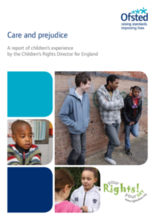This report is based on a survey of 316 children and discussions with a further 46 children. Children in the survey saw the best things about being in care as meeting new people, having good staff or carers who look after them well, activities that being in care means they can do, and having their own possessions. Foster children were most likely to say that good carers were the best thing, and those who had been in care longer were most likely to say that meeting new people was the best thing. Being in care can mean being away from dangers at home. It can also mean having more activities and opportunities, and sometimes better education, than children not in care. Being in care could mean feeling more closely supervised and needing more permissions for things than other children.
Children saw the worst thing about being in care as missing their family. Missing their family got less the longer children spent in care and away from their families. Disabled children particularly missed being with brothers, sisters and friends.
The majority of children told surveyors they had not been treated either better or worse than others for being in care. Around a third reported having at some time been treated better, and a similar proportion reported having at some time been treated worse. Girls and children in foster homes were more likely to have been treated better for being in care. Better treatment usually involved being helped and supported more than other children. Being bullied by other children for being in care was the most usual way of being treated worse. The longer children spent in care, the more likely they were to report sometimes being treated worse, rather than better, for being in care.
Being in care can make a difference to how other children, teachers and other professionals react to a child or young person. Sometimes this is bad, sometimes good, but other people often have fixed views about children in care, and these are often not good ones. A group of children we asked about educational chances reported that overall, children in care still get much the same educational chances as other children.
Half the children said that being in care made them feel different from other children. More girls felt different, and young people felt more different the longer they were in care. The main reasons for feeling different were living away from their family, and having some very different life experiences to other children.
Just under a third of children said there was nothing that coming into care had stopped them from doing. For around a quarter, it had stopped them seeing their family regularly; over a quarter said it had stopped them spending so much time with friends. For some, coming into care had stopped problem and risky behaviour. Forty-four per cent of children (especially girls and children in children’s homes rather than foster homes) were not allowed to stay overnight with friends, usually because their friends’ parents hadn’t been police checked.
Overall, children in care (but especially girls, children in children’s homes, those who had spent longest in care and disabled children) believed that the general public has a negative view of children in care. Almost half the children thought the public saw children in care as bad and uncontrollable; one in eight that the public felt sorry for them. Only one in 10 believed that the public thought children in care are the same as other children, and just under one in 12 that the public saw children in care positively.
Forty-five per cent of children worried about other people knowing they come from care, mainly because they would be judged, treated differently or bullied. Many had experienced teachers treating them differently when they knew they were from care – sometimes better, sometimes worse. They were most worried about possible employers, other children and young people, and possible future landlords knowing. Views differed on whether knowing someone was from care would be a problem in getting a job or accommodation in the future; some thought it would be a problem, others that they had enough help to overcome this.

